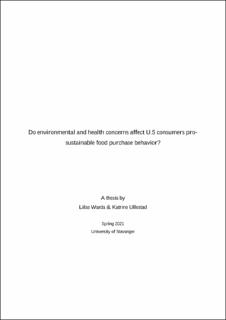| dc.description.abstract | Food production and consumption have a major impact on human health and the environment we all share. In order to achieve food security for future generations, we are dependent on changing the current food consumption. Despite an increasing focus on food sustainability and healthy consumption, the chronic diseases and greenhouse gas emission is still increasing. The aim of this thesis is to establish how environmental and health attitudes affect U.S consumers' behavior towards a more pro-environmental change. Throughout an extensive review of previous studies, we found that pro-environmental behavior change was influenced by both environmental and health attitudes. The environmental and health benefits of changing the consumption pattern towards eating less beef and increasing plant-based meat consumption are highlighted. We developed a conceptual framework from these findings, which has been used to study behavior change due to environmental and health attitudes in the context of the U.S. We also considered how these attitudes could be used in strategic implications to achieve behavior change, which can be utilized by stakeholders.
This study uses data from a survey conducted as a part of a larger project funded by the Research Council of Norway. Results are estimated by logit models and average marginal effects. All estimated results show the hypothesized effects. The most exciting result was the difference between environmental and health-conscious consumers. These consumers were first discovered to be different people. Although the environmentally conscious consumers were likely to change in a pro-environmental food behavior, there was estimated no relationship between health-conscious consumers and the willingness to increased consumption of plant- based meat. This result indicates the need for extended research on these two groups of consumers to target them appropriately. Therefore, our findings are beneficial for the U.S government, stakeholders, and the food sector. This research can contribute to the literature on how environmental and health attitudes influence pro-environmental behavior change. | |
